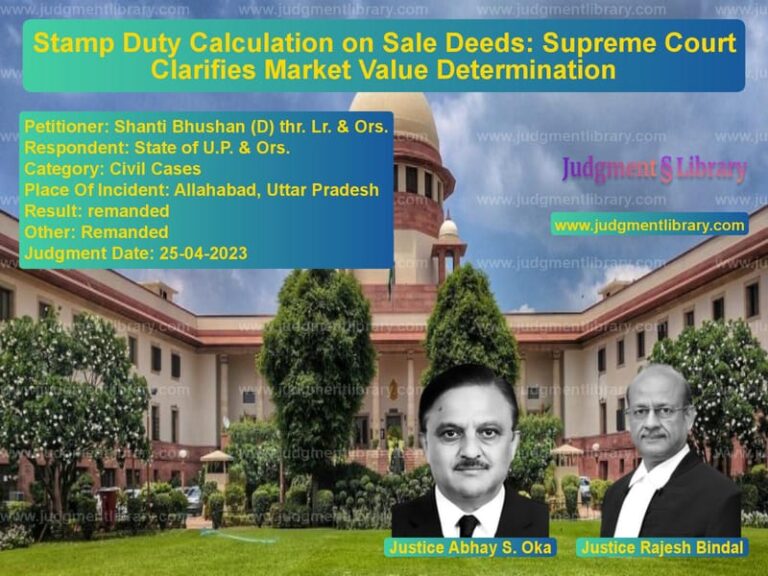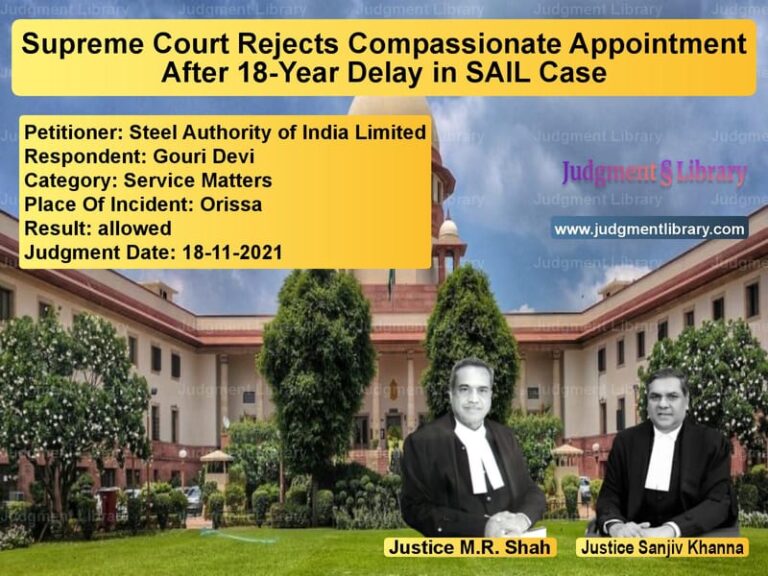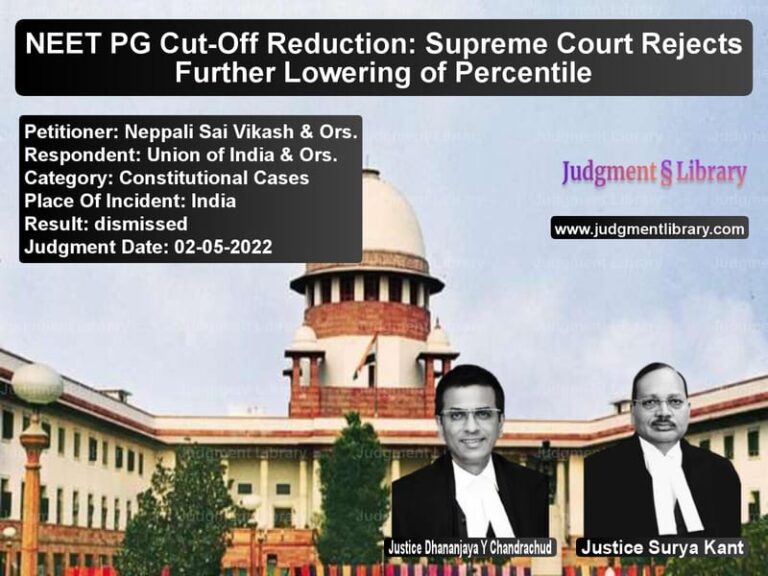Supreme Court Upholds Karta’s Right to Sell Joint Hindu Family Property
The case of Beereddy Dasaratharami Reddy vs. V. Manjunath & Anr. revolves around the legal authority of a Karta (head of a joint Hindu family) to execute a sale agreement of ancestral property. The Supreme Court of India examined whether the agreement to sell executed by the Karta was valid and enforceable. The ruling reaffirmed the established legal principle that a Karta has the power to alienate joint family property for legal necessity or the benefit of the estate.
Background of the Case
The dispute arose over the sale of 11 acres and 21 guntas of agricultural land in Chitradurga District, Karnataka. The land was jointly owned by a Hindu undivided family (HUF) consisting of:
- K. Veluswamy (Karta and father)
- V. Manjunath (son of Karta)
- V. Manimegala (wife of Karta)
On December 8, 2006, K. Veluswamy, acting as Karta, executed an agreement to sell the family property for Rs. 29 lakhs and received an advance payment of Rs. 4 lakhs from the appellant, Beereddy Dasaratharami Reddy. The agreement was also signed by Veluswamy’s wife, but not by his son, V. Manjunath.
Legal Proceedings
Trial Court (Senior Civil Judge, Hiriyur)
The appellant filed a suit for specific performance of the agreement. The Trial Court ruled in his favor, rejecting the defense that the agreement was merely a loan transaction. It held that:
- The agreement was valid as it was executed by the Karta.
- The sale was for legal necessity, which is a recognized ground for alienating joint Hindu family property.
High Court of Karnataka
V. Manjunath challenged the Trial Court’s decision in the Karnataka High Court. The High Court overturned the ruling, stating:
- The sale agreement was unenforceable as the property was jointly owned by three family members.
- Since V. Manjunath had not signed the agreement, it could not be executed without his consent.
- Legal necessity was not proved, and the Karta did not have the authority to sell without the consent of all co-owners.
Supreme Court’s Analysis and Judgment
The Supreme Court analyzed whether a Karta could alienate joint Hindu family property without the explicit consent of all coparceners.
Karta’s Authority to Sell
The Court reaffirmed the settled principle that a Karta has the authority to manage and alienate joint family property under Hindu law. Referring to past rulings, the Court noted:
“A coparcener who has a right to claim a share in the joint Hindu family estate cannot seek an injunction against the Karta restraining him from dealing with the property.”
As per Hindu law, the Karta has the power to alienate joint family property in the following cases:
- For legal necessity
- For the benefit of the estate
- For essential family expenses
Legal Necessity in the Present Case
The agreement to sell explicitly stated that the sale was needed for meeting domestic necessities. The Court observed:
“The need for funds is duly reflected in the agreement, which states that the executants were in need of funds to meet domestic necessities.”
Furthermore, the property was mortgaged to a bank, and the sale proceeds were to be used to clear the loan. This indicated legal necessity.
Consent of All Coparceners
The Court rejected the High Court’s reasoning that the agreement required Manjunath’s signature, stating:
“Signatures of V. Manjunath were not required. The Karta was entitled to execute the agreement to sell, and the absence of his signature is inconsequential.”
Key Takeaways from the Judgment
- A Karta can sell joint family property if it is for legal necessity or benefits the estate.
- Legal necessity includes maintenance, loan repayment, marriage expenses, and litigation costs.
- The consent of all coparceners is not mandatory for a sale executed by the Karta.
- A sale agreement is valid if executed for legal necessity, even if some coparceners object later.
- Lis Pendens Doctrine Applies: If a property under litigation is transferred to a third party, the new owner is bound by the court’s decision.
Final Judgment
The Supreme Court allowed the appeal, restoring the Trial Court’s decree. It ordered:
- The appellant must deposit the balance Rs. 25 lakhs within eight weeks.
- After payment, the Karta must execute the sale deed.
- Physical possession of the property must be handed over.
- If the property was transferred to a third party, the sale is subject to the court’s ruling.
Conclusion
The Supreme Court’s ruling reinforces the well-established principle that a Karta can alienate joint Hindu family property without obtaining explicit consent from all coparceners. This decision protects the rights of third-party buyers and provides clarity on the powers of a Karta in managing family assets. It also upholds the sanctity of legal necessity as a valid ground for alienation of joint property.
Petitioner Name: Beereddy Dasaratharami Reddy.Respondent Name: V. Manjunath & Anr..Judgment By: Justice M.R. Shah, Justice Sanjiv Khanna.Place Of Incident: Chitradurga, Karnataka.Judgment Date: 13-12-2021.
Don’t miss out on the full details! Download the complete judgment in PDF format below and gain valuable insights instantly!
Download Judgment: beereddy-dasarathara-vs-v.-manjunath-&-anr.-supreme-court-of-india-judgment-dated-13-12-2021.pdf
Directly Download Judgment: Directly download this Judgment
See all petitions in Property Disputes
See all petitions in Succession and Wills
See all petitions in Specific Performance
See all petitions in Judgment by Mukeshkumar Rasikbhai Shah
See all petitions in Judgment by Sanjiv Khanna
See all petitions in allowed
See all petitions in supreme court of India judgments December 2021
See all petitions in 2021 judgments
See all posts in Civil Cases Category
See all allowed petitions in Civil Cases Category
See all Dismissed petitions in Civil Cases Category
See all partially allowed petitions in Civil Cases Category







